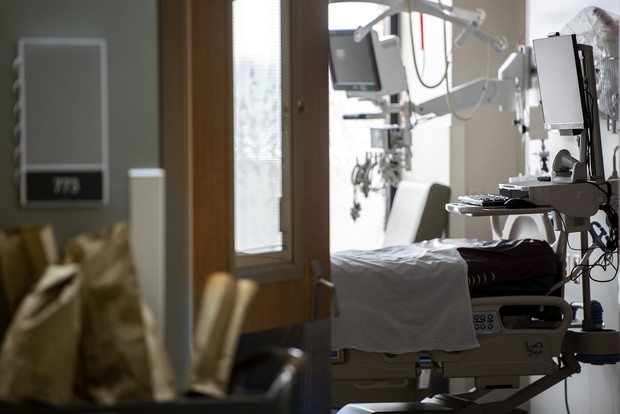Hospital Association Reports Worsening Nurse Shortage
Burnout, violence against healthcare workers driving high job vacancy rates.

Light shines in to an empty ICU room Wednesday, Jan. 5, 2022, at Meriter Hospital in Madison, Wis. Angela Major/WPR
Wisconsin hospitals are bracing for a “rapid pace” of nurses retiring following successive surges of COVID-19 over the course of two years, joining those who haven’t already retired or moved on to other jobs.
A recent survey done by the medical staffing agency, Incredible Health in California, shows a third of nurses will leave their position by the end of 2022. And a personnel survey by WHA showed registered nurse vacancy rates in Wisconsin in the double digits for the first time since 2005, according to the organization’s most recent report which declared “the nursing shortage has arrived.”
Vacancy rates for other positions also rose dramatically last year the report said, including:
- Prior to 2021, about 1 in 4 certified nursing assistants would change jobs; in 2021 it was 1 in 3.
- Certified nursing assistant turnover far exceeds every other segment of the hospital workforce.
- Prior to 2021, about 1 in 10 registered nurses changed jobs annually; in 2021 that number was approaching 1 in 5.
Some of that is demographics — middle-aged workers may be more likely to stay put while younger workers are less likely to do so said Ann Zenk, WHA’s senior vice president of workforce and clinical practice.
“Gen Z, millennials are much more mobile than Baby Boomers in terms of their willingness to leave a job for advancement or promotion in another job, and that higher turnover is something employers are going to have to work on,” she said.
Underscoring the last point, WHA President and CEO Eric Borgerding told a group of health professionals in Madison that post-acute care may need to be reassessed.
“I think we learned a lot of lessons from COVID, we revealed a lot of strengths in our health care system that we need to leverage, but we’ve also uncovered a lot of weaknesses in our care system that we cannot let go uncorrected,” he said a day before the workforce report was released.
The report had several recommendations to bolster Wisconsin’s health care workforce and create an infrastructure for public health and emergency preparedness that can stand up to future outbreaks including:
- Break down barriers to entering and remaining in the health care workforce, including legal, regulatory and payer barriers, burden and burnout.
- Identify practice, policy and payment reforms to advance team-based care and allow health care professionals and teams to reach their full potential.
- Leverage technology to both improve care and reduce workforce demands.
- Create and make clear educational and occupational pathways to attract new entrants to frontline technical and clinical positions in the health care workforce.
- Define innovative and sustainable strategies to meet the evolving workforce expectations to recruit and retain the health care workforce necessary to meet rising demand.
- Reshape the continuum of care, and public health and emergency preparedness infrastructure to mitigate over-reliance on hospitals, health systems and the health care workforce to meet post-acute and public health needs.
Listen to the WPR report here.
Wisconsin Hospital Association: ‘The nursing shortage has arrived’ was originally published by Wisconsin Public Radio.




















